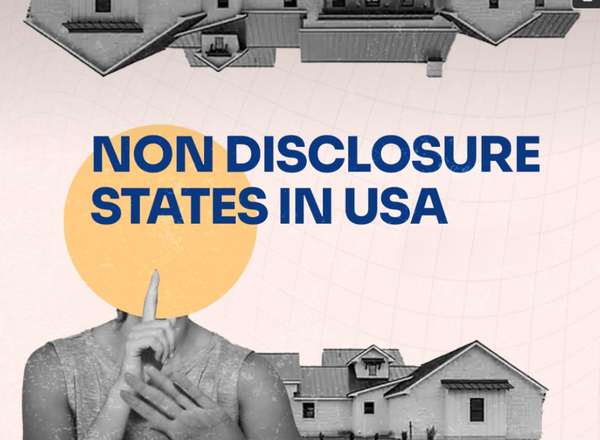When you plan to buy a house, paying a fair value for the property will be your top priority. This fair value, or fair market value, as it’s known in real estate terms, is determined from the evaluation of the property. Many factors dictate this value, such as the area, amenities, and the value of similar properties in your neighborhood.
For example, if you’re buying a house in Louisiana, you need to check if Louisiana is a non-disclosure state. A non-disclosure state is one where the selling prices of properties are not legally required to be made public.
This is to protect the privacy of buyers and sellers. However, this affects the assessed market value of a property and the property taxes associated with it. This is why it’s important to know whether the state you’re buying property in is a disclosure or a non-disclosure state in the USA so that you only pay what's fair.
What are Non-Disclosure States?
In the United States, there are 12 states declared as non-disclosure states. In non-disclosure states, property owners are not required to publicly disclose selling prices, neither public records of sale prices are maintained.
Limited data is available to the general public in these 12 states, limiting transparency in real estate transactions. While the intention is to protect the privacy of buyers and sellers, it is a little hard to determine fair market value or appeal property tax assessments.
Key Features of Non-Disclosure States:
- Privacy Focus: Sale prices are kept confidential and are typically shared only between the buyer, seller, and their respective parties (e.g., agents, lenders).
- Impact on Tax Assessment: Property tax assessments in these states rely on indirect methods, as the sale prices aren't publicly accessible.
Role of MLS: Access to real estate market data often depends on the Multiple Listing Service (MLS), which is available to licensed real estate professionals.
Which States in the US are Non-Disclosure?
There are 12 non-disclosure states as of 2026. Here are some details about each:
Alaska
Alaska is fully non-disclosure. If you’re investing in property here, check property taxes and assessments. However, Alaska requires sellers to disclose the condition of the property unless both the seller and buyer agree to waive this.
Idaho
In Idaho, sale prices of properties are not disclosed, but the property condition must be. The decision to disclose prices rests with the buyer and seller.
Kansas
Investing in Kansas means contacting a real estate agent with access to the MLS to understand property market values. Kansas has 12 local realtor boards, or you can seek information from the assessor’s office.
Louisiana
Although a non-disclosure state, Louisiana has 10 local realtor boards. Agents with MLS access can guide you with your purchase.
Mississippi
Sales prices in Mississippi are not disclosed, and realtor boards don’t publish market research. Deeds typically list a token $10 as a consideration amount. Local realtors are essential for market insights.
Missouri (Partial)
Some counties in Missouri are non-disclosure, but areas like St. Louis City, St. Louis County, and Jackson County mandate sales price disclosures.
Montana
In Montana, sales prices are not public. Research can involve the assessor’s office or MLS access through real estate professionals.
New Mexico
This is strictly non-disclosure. Property prices are disclosed only to the registered property owner.
North Dakota
North Dakota’s sales prices are not public. Engaging with a realtor with MLS access is crucial for market research.
Texas
While Texas is non-disclosure, the MLS can provide property details. To save more on your property taxes, reach out to Bezit.
Utah
Utah is strictly non-disclosure and goes further to ensure sales prices aren’t available, even on the MLS. Property owners can pay $500 to keep their sales price private.
Wyoming
Though non-disclosure, sales information is accessible via MLS, simplifying market research.
What Does This Mean for Homeowners?
As a prospective homeowner, buying property in a non-disclosure state like Texas means sales prices aren’t publicly accessible. This can complicate determining fair market value or challenging property tax assessments.
If you disagree with your property assessment in Texas, filing a protest requires comparable sales data. Without public access to sales prices, your protest case may lack substance and be less successful.
Tips for Gathering Proof for a Protest
Although sales prices aren’t disclosed, you can take the following steps to support your protest:
- Contact a Real Estate Professional: Many agents have MLS access and can provide valuable insights into market conditions.
- Leverage Agent Relationships: Trusted agents may help you access necessary data.
- Consult Public Records: Local government or county offices may have partial information for your case.
How Can a Property Tax Protest Company Help?
Yes, property tax protest experts, like Bezit, provide detailed market research for free to strengthen your case. In non-disclosure states, their expertise ensures you pay fair property taxes or potentially secure a reduction.
Conclusion
Living in a non-disclosure state like Texas comes with challenges, especially regarding property tax protests. However, with the help of our real estate professionals, property tax experts, and available public resources, the process can be navigated effectively.

